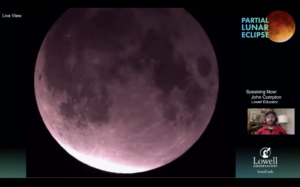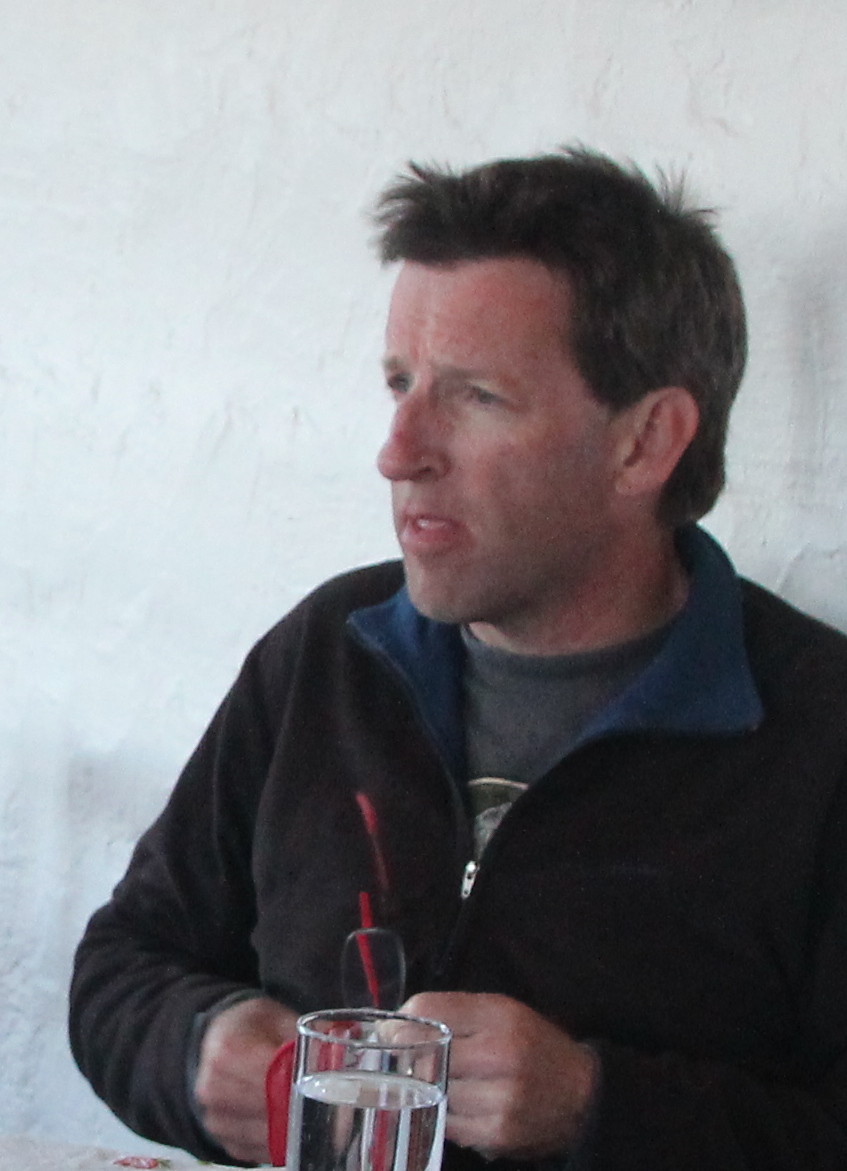The 16-year-old was surprisingly easy to roust from sleep at 1:30, even if the room was almost pitch black. The full moon light that had earlier been seeping its way around the edges of the blind had diminished to almost nothing.
A wrap of a down jacket around his shoulders, and a minute later we were outside on the back patio, with its wintertime view of the sky above unobstructed. We were grateful that the weather remained fairly warm for November.
Above, the full moon glowed, but not with its usual pale intensity. That had shrunk to a fingernail arc of bright white facing to the south. The rest of the moon glowed a salmon color, apparently from within, as if it were a giant sphere of charcoal left afire in some unimaginable celestial calamity.
It looks like an eyeball, I suggested, looking straight down Milton Road.
Oh, now I can’t unsee that, he said. And on we watched, knowing that the eclipse had shrunk the directly lit face of the moon to that bare sliver, and wondering whether it would further diminish into nothing. I couldn’t remember whether it was supposed to be a total eclipse or not.
We’d know if we were watching the livecast from Lowell, I thought, though for me the immediate sensory stimulation of being out on a cold night under clear sky, watching something exceptional happening high above, ranked way higher than listening to even the most well-informed astronomer explaining things on a screen. I liked imagining the way Earth was so clearly casting its enormous shadow out into the cosmos. It does this at every moment, I guess, but most of the time there’s nothing out there to intercept the shadow. I imagined it spreading outward like the obverse of a giant searchlight beam, an absence of sunlight that most of the time encounters nothing that could be shaded. Nothing cast into nothingness, you might say.
But this time there was something to encounter, namely the moon, and what was more striking was that the moon moved right along the edge of Earth’s shadow cone. We talked about the geometry involved, how the shadow must be moving west, from our perspective, just as the moon was, resulting in our satellite’s long dalliance with darkness, the almost-totality of the eclipse.
We’re lucky to be watching this from Flagstaff, I thought. Not only because the Lowell livestream was coming from a building less than a mile away from us, but also because I knew that it was in part observatory people who had been prescient enough to preemptively protect Flagstaff’s dark skies. As early as the late 1950s, Lowell astronomers had campaigned for strict light pollution controls that resulted in Flagstaff ultimately being designated the first International Dark-Sky City in 2001. Imagine watching this from the sickly peach glow of nighttime Phoenix, I thought; surely there’s no way the moon would so clearly look like an ember.
Lowell has been in the news locally of late because of its effort to update the 1910 act of Congress that granted it the right to use federal land atop Observatory Mesa “for observatory purposes.” By getting rid of that proviso, officials claimed, the observatory would be able to grow in a targeted way, thereby helping to assure its financial future.
Not so fast, many Flagstaff residents said, especially when the Observatory came to the city council to request a letter of support. They worried that removing the restrictive language would open the door to all possible forms of development. It’s an understandable concern, given the seemingly unstoppable epidemic of building going on all around us. In the end, a week before the eclipse the council voted not to support Lowell’s request. And in response, the Observatory withdrew its request for Congress to update the 1910 act.
The teenager went back to bed. I stayed up for a bit more, wondering what the experience would have been like had Congress never granted the land, or if Percival Lowell had decided to build elsewhere, or if the Observatory had simply folded at any time during the intervening decades. There likely wouldn’t be a dark skies ordinance. Section 17, the land in question atop the mesa, would perhaps still be Forest Service land—or perhaps by now sufficient development pressures would have gathered that a different act of Congress could have released it from the public domain, as has happened elsewhere. Perhaps there’d be a neighborhood up there rather than a tangled and much-loved assortment of planned and unplanned trails. Maybe in the absence of the astronomers Flagstaff never would have become the unique science-loving city it is today.
And maybe in their absence I would have felt comfortable writing a column about a lunar eclipse without looking up the details. Maybe I would unquestioningly have written that the Earth’s shadow must be a giant cone expanding ever farther into the cosmos. I did imagine it that way, a dark-night version of the searchlight cone that calls Batman to action. But I was wrong. Because the sun is bigger than our planet, the Earth’s full shadow shrinks as it extends outward, diminishing to nothing at the so-called antisolar point some 870,000 miles beyond Earth. If the moon were farther away than that, we’d never see a total lunar eclipse. The penumbra or partial shadow, on the other hand, does go on forever.
So consider this a column of thanksgiving for our good neighbors at the Observatory, who keep my understanding of the cosmos as close to accurate as possible, and who now more than ever need Flagstaff to be good neighbors too. It’s all too easy to take an absence for granted, to forget that sometimes the appearance of nothing is actually the reflection of a whole lot of work. So consider this a song of praise that Section 17 is still open to all—nothing more than ponderosa pine forest, that is—and that our view of the night sky, eclipsed or not, remains as unobstructed by our banal lights as possible. If you want to try to be a little clever with your language, you might say, thanks, Lowell, for the nothings. For the absences that make our lives better. They’re really something.


